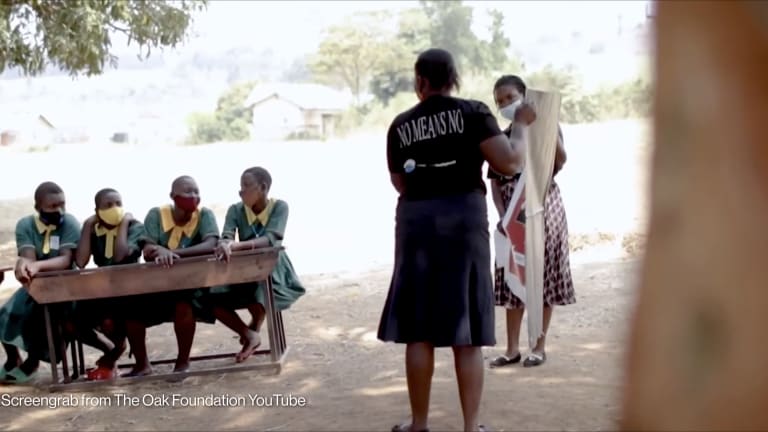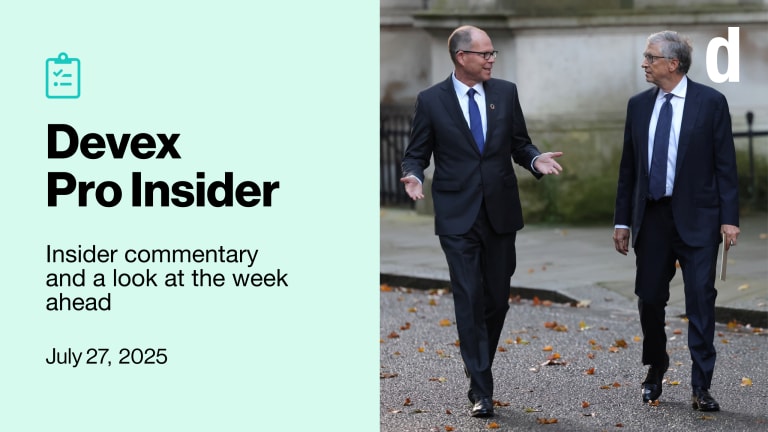
The COVID-19 pandemic has highlighted how breakthroughs in research and development do not always translate to impact for billions of people, said Kedest Tesfagiorgis, who leads the Global Partnerships & Grand Challenges team within the Discovery & Translational Sciences program at the Bill & Melinda Gates Foundation.
“We believe science and technology can make people’s lives better. But we’re living through how they don’t do so automatically. We cannot talk about what’s happening in the labs as if the access crisis doesn’t exist,” she said on Monday at the 17th Grand Challenges Annual Meeting, hosted by the Gates Foundation.
The Gates Foundation announced several initiatives in an effort to address that challenge, including $50 million in grants to support science and innovation in low- and middle-income countries. Experts say this is a step in the right direction but not even close to the scale of investment needed to truly democratize R&D.
An evolution of Grand Challenges
Since it was launched by the Gates Foundation in 2003, Global Grand Challenges has expanded into a family of initiatives involving donors supporting innovative solutions to global health and international development challenges. The evolution of the Grand Challenges program over the years, from operating out of Seattle, Washington — the Gates Foundation’s headquarters — to growing into a network of locally led programs, comes from a recognition that science by itself does not save lives, Mark Suzman, CEO at the Gates Foundation said.
But the first cohort of Grand Challenges grantees was nearly all from institutions in high-income countries.
“These were brilliant, dedicated researchers, but we knew there were many other brilliant, dedicated researchers we weren’t supporting,” Suzman said.
Gates Foundation announces $50M funding for locally led science
The powerhouse funder says the participation of women is also key to its new grant initiative.
He said the foundation needs to change the way it works in order to support thriving research and development ecosystems in countries around the world.
“We also need the infrastructure of science. We need regional regulatory systems. We need local manufacturing capacity. We need networks of laboratories. We need delivery platforms. And, most importantly, we need the ideas and the leadership of people who are experiencing the very challenges we’re working together to address,” Suzman said.
‘Geographically distributed scientific capacity’
A huge wave of scientific innovation is emerging from countries in sub-Saharan Africa, said Francis Collins, director of the National Institutes of Health.
“Let’s move the center of gravity to where it belongs,” he said in a panel at the Grand Challenges meetings.
Collins mentioned the Coalition for African Research and Innovation, which aims to unlock funding to support science, technology, and innovation initiatives in Africa, as one example of the kind of work needed to help African countries build their research capacity, not just for COVID-19 but for a range of global health challenges.
He called for a shift “from donorship to ownership,” moving “away from the colonial model” of global health to one in which LMICs “have the chance to define their own research agenda.”
The Gates Foundation announced a number of new investments to support what Trevor Mundel, its president of global health, called “geographically distributed scientific capacity.”
That includes the Grand Challenges Global Call to Action, a 10-year initiative that will prioritize grants to scientists from LMICs to ensure they play a greater role in shaping the research and development agenda, with an initial commitment of $50 million from the foundation.
“We have come to realize over the years, and COVID has made it plain, that to help everyone have the chance to lead a healthy and productive life, we need to make sure that state-of-the-art science isn't just being funded in Seattle or Cambridge or Geneva, but in first-rate laboratories, clinics, and hospitals all over the world,” Mundel said.
The foundation also launched the Global Immunology and Immune Sequencing for Epidemic Response program, to ensure scientists in more places have the capacity to detect if new COVID-19 variants might evade immune response.
Moving forward, the foundation will continue to fund groundbreaking science, while also increasingly supporting local R&D, Mundel said.
The announcements did not come without criticism.
Jeremy Kamil, an associate professor of microbiology and immunology at Louisiana State University Health in Shreveport, questioned if any strings will be attached to this funding for virus sequencing.
“What defines colonialism isn’t where investments are made,” but who benefits from them, he said on Twitter, adding that the announcement raises questions about whether some of these investments are “simply being made to extract raw sequence data” from LMICs. “Whose data is it?” he asked.
Defining the agenda
Fyezah Jehan, chair of the department of pediatrics and child health at the Aga Khan University in Pakistan, said the Gates Foundation’s commitments are significant in terms of magnitude but can be improved in terms of scale.
“We need to make sure that state-of-the-art science isn't just being funded in Seattle or Cambridge or Geneva, but in first-rate laboratories, clinics, and hospitals all over the world.”
— Trevor Mundel, president of global health, Gates FoundationWhile there have been great strides in helping countries such as Pakistan do pathogen sequencing, the country still has a long way to go in a huge range of areas, including rapid testing for emerging pathogens, vaccine research, and data analytics, she said in an email to Devex.
Jehan said she is hopeful COVID-19, and efforts to prepare for future pandemics, could lead to a real democratization of R&D for LMICs.
“I believe that this new health security challenge is a huge opportunity for LMICs,” she said. “We also need to embrace new technologies and demand assistance for both technical capacity building and resources, so demand for a seat at the table.”
As Devex reported, following the announcements at Grand Challenges, three new requests for specific proposals are open, focused on digital health services for pregnant women, building malaria modeling, and innovations to end neglected tropical diseases.
This still comes across as the Gates Foundation “setting the agenda,” not only in terms of topic areas but in terms of technology-driven approaches, said David Beran, a researcher and lecturer in the division of tropical and humanitarian medicine at the Geneva University Hospitals and University of Geneva.
Beran said it remains to be seen how this funding from the Gates Foundation will actually impact scientists and innovators in LMICs, who often “live grant to grant.”
He said he hopes to see support for research and development in LMICs transition from funding for specific projects to longer-term collaborations in support of priorities set by those researchers and help them build “the research infrastructure” they need to succeed.








